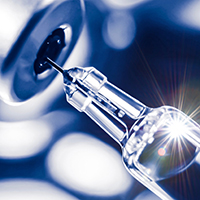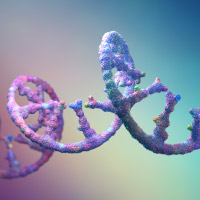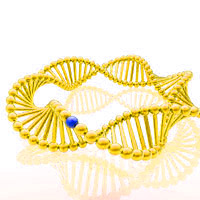Oxidation-resistant recombinant RNase inhibitor

Recombinant RNase Inhibitor ver.2.0 is an oxidation-resistant RNase inhibitor that is highly stable in enzymatic reactions requiring low DTT concentrations, such as in vitro transcription, in vitro translation, or RT-PCR. Derived from porcine liver, Recombinant RNase Inhibitor ver.2.0 displays enhanced oxidation resistance due to a mutation in a cysteine residue that is very sensitive to oxidation, which prevents degradation and inactivation of the enzyme under oxidizing reaction conditions.
Recombinant RNase Inhibitor ver.2.0 is an oxidation-resistant RNase inhibitor that is highly stable in enzymatic reactions requiring low DTT concentrations, such as in vitro transcription, in vitro translation, or RT-PCR. Derived from porcine liver, Recombinant RNase Inhibitor ver.2.0 displays greatly enhanced oxidation resistance due to a mutation in a cysteine residue that is very sensitive to oxidation, which prevents degradation and inactivation of the enzyme under oxidizing reaction conditions.
The enzyme forms a 1:1 complex specifically with RNase A to inhibit RNase activity; however, it is not effective against RNase H activity. The inhibitory reaction is reversible, and the inhibitor can be irreversibly inactivated to restore ribonuclease activity by dissociating the complex with urea or a sulfhydryl reagent. Moreover, unlike other non-protein competitive inhibitors (e.g., nucleotides and inorganic phosphates), it can easily be removed from the reaction system by phenol extraction.
Recombinant RNase Inhibitor, HQ (high quality) has equivalent performance to Recombinant RNase Inhibitor ver.2.0, but has been manufactured with stricter quality standards and is supplied in a higher concentration and volume for scaling up your processes. It is free from human- or animal-derived materials, as well as free from β-lactam compounds in the final formulation.
Do you want to explore OEM options? Contact OEM Services & Support at oem@takarabio.com.
For more information on the differences between our research, HQ, and GMP grade enzymes, please refer to the HQ-grade reagents page.
Overview
- Efficient RNAse A inhibitor
- Highly stable against oxidation
- Ideal for applications requiring low DTT concentration, such as in vitro transcription, in vitro translation, or RT-PCR
- Suitable for long-term storage of samples
Recombinant RNase Inhibitor ver.2.0 is highly resistant to oxidation

Figure 1. Comparison of oxidation resistance among different commercially-available recombinant RNase inhibitors. 16S/23S rRNA was mixed with DTT-free buffer, RNase A, increasing amounts of H2O2, and either Recombinant RNase Inhibitor ver.2.0 (Cat. # 2135; purple line), Recombinant RNase Inhibitor (Cat. # 2313; blue line), or a commercially-available, oxidation-resistant murine RNase inhibitor (Company N; green line). After incubation at 37°C for 10 min followed by incubation at 25°C for 10 min, each reaction was centrifuged at 13,000g for 15 min at 4°C. Nucleic acids released into the supernatant were measured as an indicator of RNase A-mediated rRNA degradation using a NanoDrop spectrophotometer. At concentrations above 0.1% H2O2, the use of Recombinant RNase Inhibitor ver.2.0 resulted in less rRNA degradation compared to other RNase Inhibitor products. n=2, where each experiment was performed in triplicate.
More Information
Applications
- In vitro transcription/translation (1 U/µl reaction)*
- In vitro transcription/translation with cell-free extract (20 U/µl reaction)*
- RT-PCR (0.5 U/µl reaction)*
- cDNA synthesis (0.5 U/µl reaction)*
- Polysome isolation (1 U/µl reaction)*
*The parentheses show the recommended concentration for each application. For a unit definition, please refer to Certificates of Analysis under the Documents tab.
Source
Escherichia coli carrying a plasmid containing a mutated gene for ribonuclease inhibitor from porcine liver.
Properties
- Molecular mass: approx. 52 kDa
- Optimal pH: maximum inhibition of RNase A occurs at pH 7–8, though inhibition is observed over a broad pH range
Additional product information
Please see the product's Certificate of Analysis for information about storage conditions, product components, and technical specifications. Please see the Kit Components List to determine kit components. Certificates of Analysis and Kit Components Lists are located under the Documents tab.

Speed up your vaccine development with innovative technologies
Vaccines have significantly decreased the burden of infectious diseases worldwide since the development of the first vaccine more than 200 years ago that led to the eradication of smallpox. In recent years, the spread of severe infections has highlighted the critical need for the rapid development of vaccines against previously unknown pathogens to deal with pandemics such as COVID-19.
Discover how Takara Bio can help speed up your vaccine-development process.
Learn moreTakara Bio USA, Inc.
United States/Canada: +1.800.662.2566 • Asia Pacific: +1.650.919.7300 • Europe: +33.(0)1.3904.6880 • Japan: +81.(0)77.565.6999
FOR RESEARCH USE ONLY. NOT FOR USE IN DIAGNOSTIC PROCEDURES. © 2025 Takara Bio Inc. All Rights Reserved. All trademarks are the property of Takara Bio Inc. or its affiliate(s) in the U.S. and/or other countries or their respective owners. Certain trademarks may not be registered in all jurisdictions. Additional product, intellectual property, and restricted use information is available at takarabio.com.





